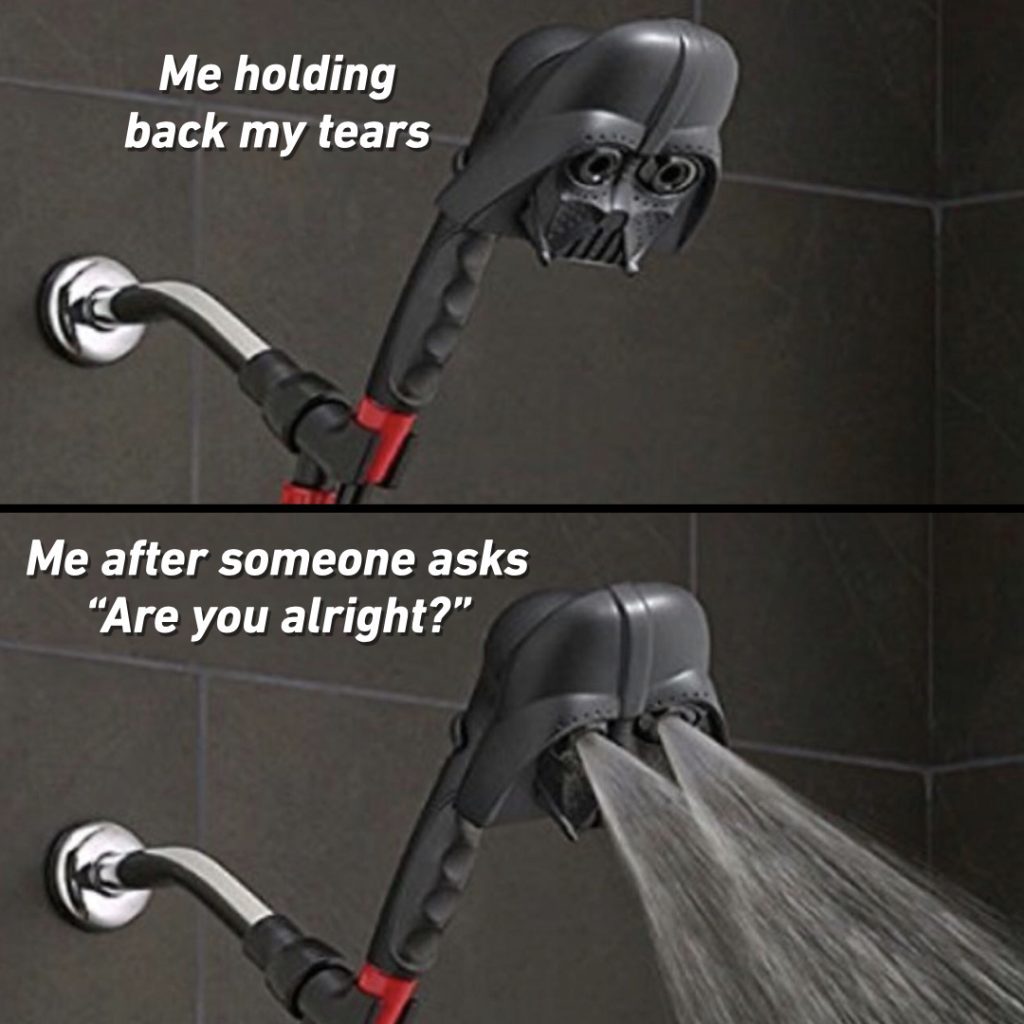You know that moment when someone asks, “Are you alright?” and suddenly your carefully built emotional dam bursts like a cracked fire hydrant? Yeah. We’ve all been there.
Sometimes it’s not the major heartbreaks or the loudest arguments that push us over the edge—it’s that one soft question, said with just enough kindness to cut through the noise. Suddenly, you’re Darth Vader in the shower head meme: stone-faced one second, sobbing fountain the next. Let’s talk about why that happens, what it means, and why letting go might actually be the healthiest thing you do all day.
Why We Hold Back Our Tears in the First Place

Crying is human. But let’s face it—we’re conditioned to keep it together.
Whether it’s from childhood (“Don’t cry, be strong”), professional pressure (“Stay composed”), or our own inner dialogue telling us to “suck it up,” many of us bottle things up like emotional soda cans. We become experts at wearing masks and hiding the chaos underneath.
We’re afraid of looking weak. Or worse—being a burden.
But suppressing emotion doesn’t make it disappear. It just stores up until the tiniest trigger—like someone simply asking if you’re okay—releases the flood.
The Emotional Domino Effect of ‘Are You Alright?’
It’s wild how four simple words can unravel a fortress of emotional armor.
Why? Because that question does something powerful: it acknowledges. It signals to your brain, “Hey, someone sees you. Someone cares.”
When you’ve spent days, weeks, or even months pretending you’re fine, hearing that one question feels like someone has unlocked a door you didn’t even realize was jammed shut. And once that door opens? Boom—tears, confessions, vulnerability… and sometimes, healing.
Crying Is Not Weakness—It’s a Pressure Valve
Ever tried holding in a sneeze? Uncomfortable, right? Holding back tears is the emotional equivalent. It creates pressure—tension that builds until something gives.
Video : Emotions and the Brain
But here’s the truth: crying is not just healthy—it’s necessary.
Tears are your body’s natural stress release. They carry cortisol (that nasty stress hormone) out of your system. They relax your body. They even trigger endorphins—the same feel-good chemicals you get from laughing or exercising.
So when someone asks, “Are you alright?” and you burst into tears? That’s your body saying, “Thank God, now we can breathe.”
The Meme That Speaks for All of Us
Let’s talk about that Vader showerhead meme. It’s funny, sure—but also painfully real.
- Top image: Vader’s face, closed tight, stoic—“Me holding back my tears.”
- Bottom image: Same showerhead, but now water is blasting from his “eyes”—“Me after someone asks ‘Are you alright?’”
It’s relatable because it’s universal. We’ve all held our emotions together in public like champions, only to fall apart the moment someone shows us a sliver of kindness. The meme works not just because it’s humorous, but because it captures a truth we rarely say out loud: we’re all just one kind word away from falling apart—and that’s okay.
How to Support Someone Going Through This
If you’ve ever been on the receiving end of a teary “I’m not okay,” you might’ve felt helpless. But don’t underestimate the power of your presence.
Here’s how to be there for someone:
- Don’t rush to fix it. Let them cry. Let them vent. Don’t try to shut it down with advice.
- Say things like “I’m here for you,” or “It’s okay to cry.” Validation is powerful.
- Avoid toxic positivity. Don’t say “At least…” or “It could be worse.” Let their feelings be what they are.
- Follow up later. That one moment of vulnerability might have meant more than you think.
Sometimes, just sitting in silence while someone cries is the most loving thing you can do.
Video : 5 Signs You Feel Emotionally Unsafe
The Importance of Emotional Safety in Everyday Life
The more emotionally safe we feel around others, the less we feel the need to hide. Imagine a world where people didn’t have to suppress everything until it exploded. Where “Are you alright?” didn’t feel like a tripwire but an open door to honest connection.
Creating emotional safety means checking in with your friends. Asking the question. Giving them permission to fall apart if they need to.
Because guess what? Most people don’t need solutions—they just need to be seen.
Conclusion: Don’t Fear the Flood—Feel It
So next time you find yourself on the edge, one kind word away from tears, don’t be embarrassed. Let it out. Emotions aren’t weaknesses—they’re signs that you’re human, alive, and still capable of feeling.
And if someone asks, “Are you alright?”—consider it a gift. You don’t have to smile and say, “I’m fine.” You can say, “Not really.” You can cry. You can be real.
Because being real isn’t the opposite of being strong. It is being strong.


